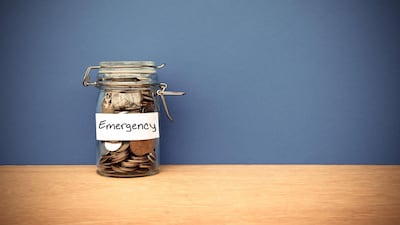When it comes to building an emergency fund, there are two schools of thought. First there is the “live dangerously” crowd who like to rely on a credit card for emergencies and then invest everything else.
The more fearful, or sensible crowd, depending on your point of view, says you should have between three to six months of expenses in a savings account or readily accessible cash. Then you can invest the rest.
Personally, I’m the fearful type, though I take it to another level entirely with up to three years of expenses saved in cash at this moment. And, boy, am I glad of that.
The “live dangerously” crowd extoll the possibility that if you had to tap into your emergency fund due to job loss, you could then sell some stocks and bonds to cover your needs until you were employed again.
In these Covid-19 times, however, it seems the perfect storm has hit, and those who lived this way are now in a very dangerous financial situation. Job losses are here, the markets have crashed, and many are now wishing they had cash saved up for this torrentially rainy day.
There are three main reasons why having an emergency fund right now is fantastic. If you don’t have one, then hopefully this line of thinking will help motivate you to build yours.
Reason 1. 'I don’t have to sell stocks when the market is down'
Right now, I am not even glancing at the value of my stocks and bonds. With three years of expenses saved up, I don’t need to withdraw from my trading account, so its value does not matter.
I’m still receiving dividends, even if they’re diminished, so it means I am buying more stocks at a steep discount. I should be buying more right now, but for my mental health, I want to keep my emergency fund as flush as possible, which means deferring buying for a bit. I may miss out on stocks being on sale, but I need to be able to sleep at night more.
Reason 2: 'I don’t have to worry about losing my job'
Rather than fearing redundancy, my emergency fund gives me the option to take a sabbatical if I want to. I already have a teaching contract secured for the next two years, the catch is that it’s at a school in China. It's a great school, which I’m sure will survive this struggle, but I’m not positive I’ll be able to get to China if international travel continues to tighten. So, I’m gearing up for that job to evaporate. Thankfully, because of my emergency fund, I can afford to take a year off. A sabbatical to hunker down and ride out the storm without a lot of responsibilities sounds pretty great. There will be a hammock involved. Instead of looking at a lack of a job with fear, I’m seeing it as an opportunity.
Reason 3: 'Building it up taught me valuable financial skills'
You cannot build an emergency fund without having some key financial skills. You need to know how to track your spending, cut your outgoings and live below your means, or you’ll never save enough. All of these skills are critical right now to help me weather this storm and come out the other side.
I know I’m very lucky to have a job. I know I’m lucky to have my health. I know I’m lucky to have a roof over my head. If you’re similarly lucky, use that luck and start building your emergency fund now. You’ll be glad you did, if not for this crisis, then for the next one.
Dubai schoolteacher Zach Holz (@HappiestTeach) documents his journey towards financial independence on his personal finance blog The Happiest Teacher

